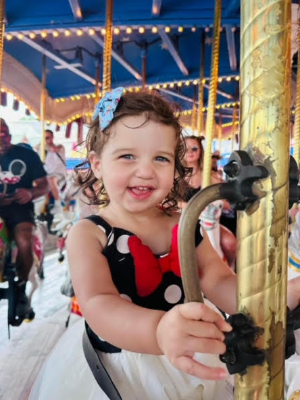
Rosalie Parisa Damavandy or "baby Rosie" as she was known in our house was an incredibly joyful, playful, and loving child who adored her parents, two older siblings, and everyone she came into contact with. Her knowing, soulful blue eyes, infectious smile, warm hugs, and propensity to growl with joy endeared her in the hearts of her family and many friends. To us, she was an absolute gift from God who was absolutely cherished during her short time in this world.
The last hours of baby Rosie's 18-month life were happy and carefree. Because her mother was working a late shift at her pediatric practice, Rosie enjoyed an intimate one-on-one dinner date with her dad, a snuggle-wrestling match on the living room floor with her dad and siblings complete with a monster chase throughout the house (two key family traditions), and was peacefully breastfed to sleep by her mother. On the morning of May 21st, her small, lifeless body was discovered by her mother in her crib. The ensuing panic, phone calls, and investigation are a blur but ultimately her autopsy revealed no abnormalities and her passing was deemed an unpreventable, quiet, medical death.
Unfortunately, baby Rosie is one of the at least 400 children every year in the US between the ages of 1 and 18 years who die suddenly and without medical explanation. This condition is called Sudden Unexplained Death in Childhood (SUDC). The small number of reported cases and lack of awareness make SUDC difficult to study and, as yet, there is little known in how to predict it and how to prevent it.
Most parents and medical professionals alike have never heard of SUDC. Unlike Sudden Infant Death Syndrome (SIDS), which occurs in children younger than 12 months of age and has garnered approximately $500 million in public funding over time, SUDC has received no public funding. Therefore, organizations like Boston Children's Hospital's Robert's Program and the SUDC Foundation are essential to raise awareness and funding to help counsel families in the aftermath of these unexplained deaths and to perform state-of-the-art research into SUDC to understand fatal underlying vulnerabilities in children and how to prevent them.
Baby Rosie's spirit taught us how much our hearts could love and we hope that through enrollment in the Robert's Program, baby Rosie's tissues can help elucidate the mechanisms of this seemingly unfair condition. Our goal is to channel the love we have for her to help build awareness and fund research so we can see a future free of SUDC. We ask that if you are so inclined, you consider joining us in making a donation to the Robert's Program in honor of her memory. We also encourage you to pray to our little angel to help intercede on behalf of your most important intentions.
With overwhelming love in our hearts and gratitude,
Florencia Segura and Al Damavandy

